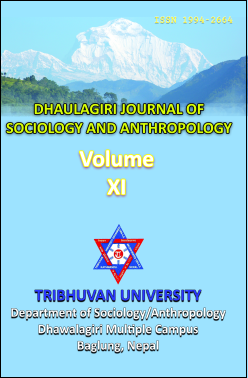Life and Livelihoods in the ‘Forbidden Kingdom’, the Trans-Himalaya, Nepal
DOI:
https://doi.org/10.3126/dsaj.v11i0.18822Keywords:
Livelihood capital, Sustainable livelihoods, Forbidden kingdom, Trans-Himalaya, NepalAbstract
Rural livelihoods in Nepal are generally based on ecosystem resources. Despite a large number of studies on the Himalayan livelihoods, representation of the Trans-Himalaya, particularly Upper-Mustang, are rare. Such a scarcity could be associated with the fact that the place was isolated from the rest of the world and mainstream Nepali societies for a long time and also used to be known as ‘forbidden kingdom.’ This paper documents livelihood situation of Upper-Mustang in reference to the data collected in 66 households, in-depth interviews taken with 22 key informants, and focus group discussions conducted in 6 locations. Household livelihood system was studied with reference to five livelihood capitals, which were transformed into Livelihood Capital Index (LCI) at first and Livelihood Sustainability Index (LSI) later. Households in the Trans-Himalaya fulfill their livelihood requirement from multiple sources such as farming and livestock ranching together with small-scale enterprises, remittance and labouring. Overall status of livelihood capital is weak that cannot satisfy households’ food and livelihood requirements. There exists inter-household variation in the status of livelihood capitals.
The households with diversified livelihood options have relatively secured livelihood, although such security is relative to the households of Upper-Mustang. Considering the weak status of agro-livestock system, which is mostly associated with unfavorable geographic conditions and lack of agro-livestock service provision, the region has sound scope for tourism industries and production as well as marketing of medicinal and aromatic plants, and fruits. Therefore, there is a plenty of possibility of diversifying livelihoods, however, neither the communities are eager to do so nor the state policies are encouraging. Therefore, together with expansion and advancement of physical infrastructure, effective service delivery and provision for social welfare, government programs should be facilitative for optimum and sustainable utilization of ecosystem resources for the sustainability of household livelihood system.
Dhaulagiri Journal of Sociology and Anthropology Vol.11, 2017; 24-59




